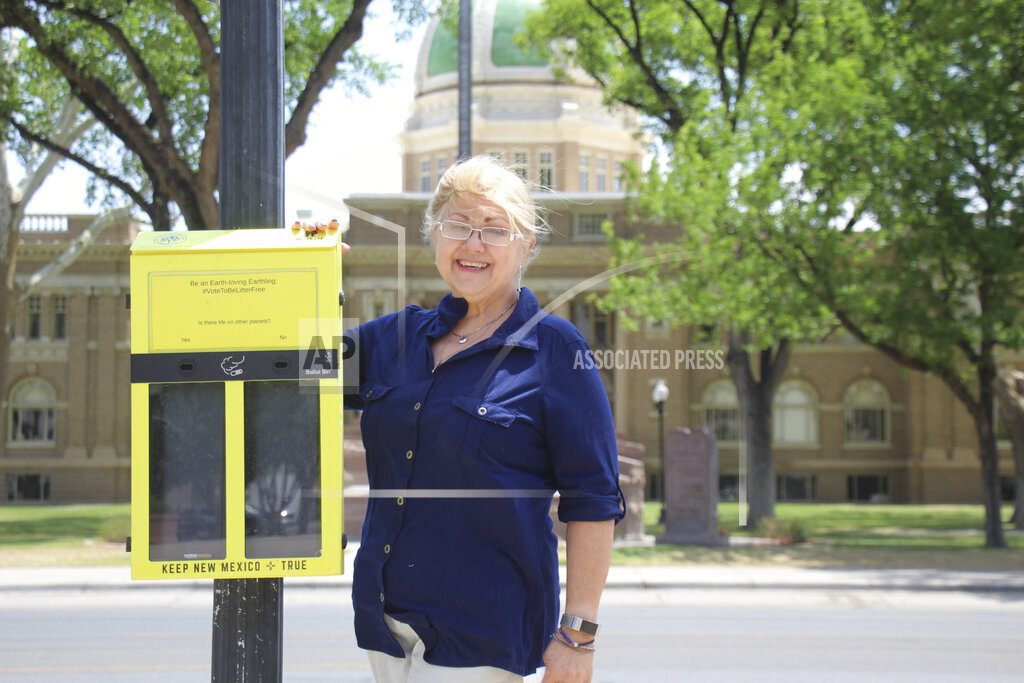Roswell ‘ballot bins’ urge residents to pick up, not litter

Kathy Lay, volunteer and outreach coordinator for the city of Roswell, N.M., shows one of the "ballot bins" for litter in downtown Roswell on Wednesday, June 1, 2022. The bins are part of a humorous campaign aimed at reducing cigarette waste in the city by asking people to "vote" on everything from UFOs to New Mexico's ubiquitous red versus green chile question. (Juni Ogle/Roswell Daily Record via AP)
ROSWELL, N.M. (AP) — A little humor can go a long way in delivering a serious message, Kathy Lay learned, so now Roswell residents and visitors can vote with their cigarette butts on questions about UFOs, aliens and New Mexico’s ubiquitous chile question.
Keep Roswell Beautiful has placed three yellow “ballot bins” at downtown bus stops that pose the questions “Is there life on other planets?” “Did aliens crash near Roswell?” and “Red or green?” Smokers can vote for their answer by placing their cigarette butts in the corresponding side of the bin.
Lay, the city’s volunteer and outreach coordinator and staff liaison for Keep Roswell Beautiful, said the bins are part of the organization’s litter prevention campaign, the Roswell Daily Record reported. Lay said when she was researching what kind of campaign the organization could do, she was surprised to see many references to cigarette butts being the No. 1 most-littered item and the dangers they pose to the environment.
“Both of those facts shocked me,” she said.
According to a 2009 study at the Center for Tobacco Control Research and Education at the University of California-San Francisco, cigarette filters are made of plastic materials that will break down under sunlight but are not bio-degradable. Further studies show the filters contain residues of the chemicals used to grow and process tobacco and manufacture cigarettes and can leach more than 4,000 chemicals into soil and water.
The study also stated that 5.6 trillion cigarettes were consumed worldwide in 2002 and that an estimated 1.69 billion pounds of cigarette butts wind up as litter worldwide.
“Even after those filters have turned into plastic dust, the toxins remain in the soils, and so we’re trying to keep them out of the general land areas and especially out of the waterways,” Lay said.
Because the cigarette butts are light, they can be easily be blown around and could eventually end up in the Spring River or Hondo River and then the Pecos River, she said. Their small size can also make them more difficult to remove from waterways, as they can get caught in vegetation, she said.
“The one fact that blew me away is that one cigarette butt in a liter of water kills half the fish,” she said. “If they get in small pools, two or three cigarettes in that area will make that part of the water toxic and start killing fish,” she said.
In designing the campaign, Lay said she didn’t want it to appear to be critical of those who do smoke.
“I didn’t want to come across as if it was trying to attack anyone, I just wanted people to understand how serious it was and how harmful they were so that people who do smoke would understand the impact and take actions that would change their behavior,” she said.
She began to research campaigns on cigarette litter and found that a humorous approach using the ballot bins — voting with your butt — has seen success.
“Every place they did these, it got a lot of buzz. Everybody would laugh and then they look into what is it about, and then they were more open to receiving the message and not feeling that it was shoving it down their throat,” she said.
She chose the questions as a fun way to reflect local and state culture, she said.
“I just wanted to hit just a couple of the things that are unique to Roswell and unique to New Mexico,” she said.
The campaigns are popular in Europe, and unable to find U.S. supplier for the ballot bins, she ended up buying them from the United Kingdom.
Lay said as she learned about the effects cigarette filters can have on wildlife, she wanted to incorporate animals into the campaign while keeping the humor. She worked with the city’s graphic designers and videographer to create billboards, social media graphics and videos featuring animals mostly native to New Mexico for a #NoButts4Me angle of the campaign.
The graphics feature animals such as an elk saying “No one wants to see your butts” and giving facts and disposal tips about cigarette filters. The short videos — posted on the Keep Roswell Beautiful Facebook page and city YouTube channel — feature different “talking” animals.
The bins have been in place for a couple of months. Lay said bus stops were chosen because those are areas where cigarette butt litter is often noticeable as people discard a cigarette before getting on the bus.
Lay collects the cigarette butts herself, she said, and sends them to a New Jersey company, Teracycle, that recycles cigarette waste. Anyone 21 or older can register to send cigarette butts to the company for free.
According to the company website, users can print off a mailing label to send a package of waste to the company.
Lay said there aren’t plans at this point to add more bins. The message is the most important part of the campaign, she said.
“I don’t know that they’re going to be that instrumental in stopping litter in that spot. I do think they’re instrumental in getting people’s attention. It’s a tool, not just for the immediate area, but as a tool to leverage to get the word out,” she said.